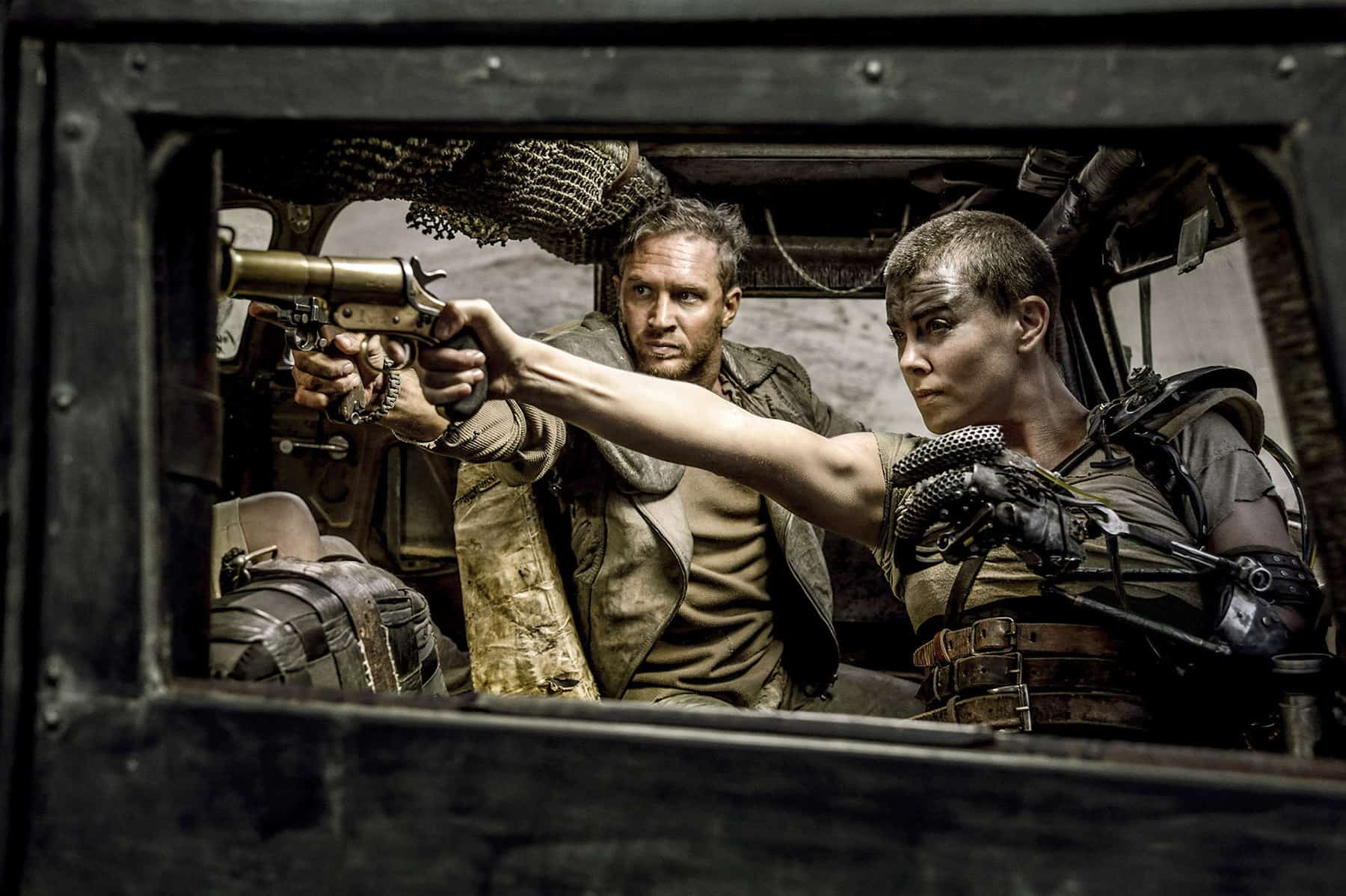It’s less irrational than it sounds that the three scarcest commodities in the post-apocalyptic world envisioned by “Mad Max: Fury Road” — gasoline, bullets and water — are expended with an almost lunatic profligacy.
Flame-belching vehicles tear across a parched, terra-cotta landscape, their drivers firing guns like cowboys in a Western. When H2O is handed out to a population dying of thirst, it comes not in bottles or jugs, but as a cataract gushing from giant pipes extending from the top of a desert cliff, so that the citizens below are only able to lap at the mist thrown up by the cascading torrent.
It is this wastefulness, the film suggests, that has led to the wasteland that the movie portrays: a nightmare world of desperate self-absorption populated by a race of mutants who have been poisoned, bodily and spiritually, by their own egotistic overindulgence. “Mad Max’s” hero — the titular crazed loner who is shown at the start of the film munching on a two-headed lizard that he has just crushed underfoot — is described by the narrator as “a man reduced to a single instinct: survive.”
To say that there is also a monomania to the film is, if anything, an understatement. But it is precisely that sense of tunnel vision that makes “Fury Road” such a pulse-pounding pleasure. When Max (Tom Hardy) is captured by the members of a warrior encampment known as the Citadel and (at first ineffectually) tries to escape, director George Miller’s camera renders that opening sequence — in surprisingly effective 3-D — as though it were playing on 4x fast-forward.
For the next two hours, the film barely taps the brakes.
Whether you are thrown from the vehicle depends entirely on you. Some viewers will never be able to hang on through the story’s careening disregard for sense, logic or moderation. I advise them not to even try. But if you know whose car you’re getting in — it helps to have seen at least one of Miller’s three previous “Mad Max” films, but it is not required — you’re in for one heck of a ride.
Generally paralleling the chase-themed plot of Miller’s second “Mad Max” film (released in the United States in 1982 as “The Road Warrior“), “Fury Road” tracks an extended vehicular pursuit, with Max and several other characters in the lead, and a small army of hunters pulling up the rear. It’s like a monster-truck motocross competition staged by a more nihilistic version of Cirque du Soleil, where the stakes are life and death.
It also comes complete with its own heavy metal soundtrack, courtesy of an on-camera musician who, throughout the chase, accompanies the breakneck action on an electric guitar played from a platform mounted on one of the film’s speeding vehicles. That this rock god periodically shoots fire from the neck of his axe, as if it were powered by napalm, is, of course, entirely laughable.
Go ahead and guffaw. If you’re not capable of appreciating the humor in any of this, including the at times over-the-top violence, you’re in the wrong theater.
In addition to amping up the vehicular mayhem from the earlier “Mad Max” canon, Miller’s reboot of the story (co-written with Brendan McCarthy and Nick Lathouris) deviates in one critical and satisfying way from “The Road Warrior.” Whereas the cargo that Max was transporting in that film was a tanker full of gasoline, his freight here is a group of young women who are fleeing servitude as “breeders,” or child-bearing slaves, back in the Citadel. His co-pilot, a Citadel fugitive called Furiosa (Charlize Theron), is in every sense Max’s equal.
That both characters are psychologically damaged — Max by the murders of his wife and child, seen only in flashback; and Furiosa by having been kidnapped into slavery as a child — darkens the corners of this already dark tale, and deepens Max and Furiosa’s connection. A third antihero is Nux (Nicholas Hoult), a disillusioned former foot soldier from the Citadel who has switched allegiances, having come to doubt his supreme leader’s promises of immortality through self-sacrifice.
If the character of Nux suggests a disenchanted suicide bomber, it’s surely intentional. That’s underscored by the theme of the Citadel’s oppression of women, and by Hugh Keays-Byrne’s portrayal of the Citadel’s deranged leader, known as Immortan Joe, as fiery demagogue. There’s an unsubtle — and welcome — feminism here, in the appearance, late in the film, of a band of badass older women, one of whom, known as the Keeper of the Seeds, is played by the 78-year-old Melissa Jaffer. She and Theron wonderfully balance out the film’s high-octane testosterone with a blast of power-nurturing.
But don’t get too wrapped up in deeper meaning. “Fury Road” is less about estrogen than adrenaline. Gorgeously art-directed, from the film’s souped-up unfunny cars to the tribal costumes and make-up to the bleakly breathtaking cinematography of the Namibian desert, it’s a case of style triumphantly squashing substance. Much of it makes little sense, such as the Citadel’s reliance on tanks of breast milk, generated by bare-bosomed earthmothers, or the script’s frequent references to the Citadel’s doomed soldiers’ having “half-lives,” which can only be extended by transfusions from living “blood bags” such as Max.
The “Mad Max” franchise was never for everyone, yet it clearly benefits from fresh blood, too. Propelled by Miller’s nitro-burning aesthetic vision and an entertaining cast, this turbo-charged new model is a gas, gas, gas.
“Fury Road” is now playing at theaters throughout Costa Rica.
© 2015, The Washington Post








